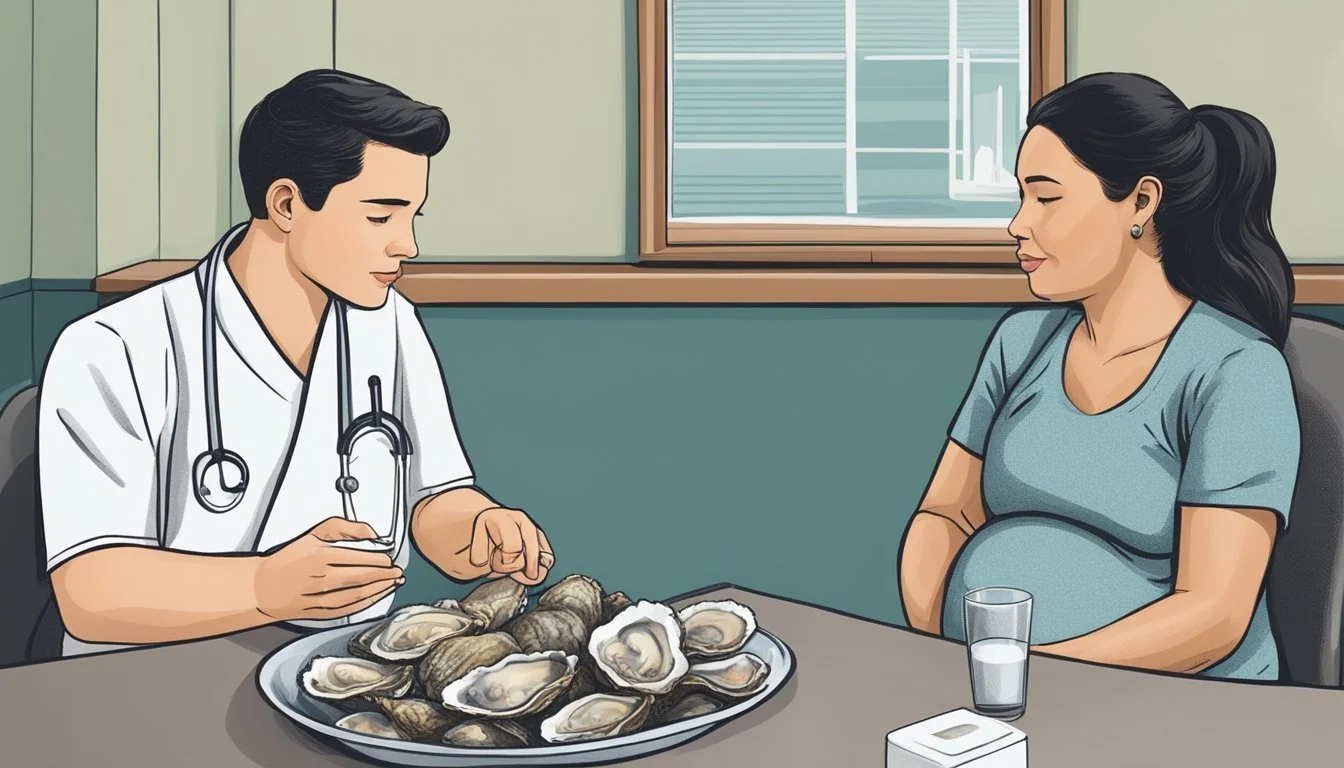Is It Okay to Eat Raw Oysters During Pregnancy?
Understanding the Risks
Eating oysters during pregnancy has become an area of concern and debate for expecting mothers. While oysters contain beneficial nutrients such as zinc and protein which are important for pregnancy, the safety of consuming them in their raw form has been questioned. The primary concern with raw oysters arises from the risk of marine pathogens, such as Vibrio bacteria, which can cause severe foodborne illnesses. These risks are heightened during pregnancy due to the changes in an expectant mother's immune system.
Guidance from healthcare professionals tends to err on the side of caution, generally advising pregnant women to avoid raw oysters. Cooking oysters thoroughly kills harmful bacteria and viruses, making them much safer for consumption during pregnancy. While missing out on raw oysters might be disappointing for some, ensuring the health and safety of both mother and child is paramount. Pregnant women seeking to include oysters in their diet can enjoy them cooked, as a safer alternative that still provides nutritional benefits.
Understanding the Risks of Eating Raw Oysters During Pregnancy
Eating raw oysters during pregnancy carries specific risks that can have significant impacts on both the pregnant woman and the unborn baby, including foodborne illness and exposure to toxins.
Bacterial Contamination and Food Poisoning
Raw oysters can harbor harmful bacteria such as Vibrio vulnificus and Listeria, which are particularly dangerous during pregnancy. These bacteria can lead to severe food poisoning. Manifestations of food poisoning from Vibrio species might include vomiting, diarrhea, and abdominal pain, while Listeria infection could lead to miscarriage or stillbirth.
Mercury and Toxins in Seafood
Seafood, including oysters, can contain varying levels of mercury and other toxins which can affect the developing nervous system of the fetus. Pregnant women are advised to avoid high-mercury seafood to prevent neurological harm to the unborn baby, although oysters are generally considered to be low-mercury seafood.
Parasites and Infections
Oysters may also be contaminated with parasites that can lead to infections. These infections might not only affect the health of the pregnant woman but could also result in complications including premature delivery.
Potential Pregnancy Complications
The consumption of contaminated seafood can result in severe complications during pregnancy. These include an increased risk for miscarriage, premature labor, and in some cases, stillbirth. Food safety practices recommend that pregnant women choose cooked over raw seafood to mitigate these risks.
Benefits of Omega-3 and Nutrients in Oysters
Oysters are a potent source of nutrients beneficial for health, especially during pregnancy. They are particularly rich in omega-3 fatty acids and other essential nutrients that support fetal development and maternal health.
Nutritional Profile of Oysters
Oysters are a nutrient-dense food providing a rich array of vitamins and minerals. They are an excellent source of:
Protein: Vital for the growth and repair of tissues
Omega-3 fatty acids: Important for brain development and reducing inflammation
Zinc: Critical for immune function and cellular metabolism
Iron: Necessary to prevent anemia and support blood oxygen transport
Vitamin D: Supports bone health and immune function
Vitamin B12: Essential for neurological function and DNA synthesis
Selenium: Plays a role in antioxidant defense and thyroid hormone metabolism
Each 100 grams of oysters contains approximately 672 mg of omega-3 fatty acids, a key component for fetal brain development and maternal health.
The Role of Seafood in Pregnancy Nutrition
During pregnancy, the requirement for certain nutrients increases to support fetal growth and maternal health. The Food and Drug Administration (FDA) has guidelines recommending that pregnant individuals should consume 8–12 ounces of seafood per week due to the beneficial omega-3 fatty acids, iron, and zinc content. However, it is essential to choose seafood that is low in mercury and other contaminants.
Seafood, including oysters, can be an integral part of a balanced diet during pregnancy if properly prepared. Consuming oysters and other shellfish in cooked form is typically advised to reduce the risk of foodborne illness. Cooked oysters retain essential nutrients such as protein, vitamins, and minerals that contribute to the health of both the mother and the developing fetus, supporting brain development and reducing the risk of anemia.
Safety Measures When Considering Seafood
When it comes to seafood consumption during pregnancy, safety is paramount. Specific guidelines and cooking practices must be adhered to in order to minimize health risks associated with raw or improperly prepared seafood, such as oysters.
FDA and CDC Guidelines on Seafood Consumption
The Food and Drug Administration (FDA) and the Centers for Disease Control and Prevention (CDC) provide comprehensive advisories on seafood consumption for pregnant individuals. They stress the importance of avoiding high-mercury fish and recommend fully cooked seafood to prevent foodborne illness. The guidelines are clear:
Eat 2-3 servings of seafood per week from the "best choices" category.
Completely avoid those listed in the "do not eat" category due to higher mercury levels.
Cooking Oysters Properly to Avoid Health Risks
Cooked oysters, when prepared correctly, can be a nutritious option with low risk of foodborne illness. The oysters should be cooked to an internal temperature of 145°F to ensure safety from pathogens. Here are the key cooking methods:
Boiling: Oysters must remain in boiling water until their shells open. Continue boiling for an additional 3-5 minutes afterwards.
Grilling: Cook until their shells open, and continue cooking for another 3-5 minutes.
Preventing Cross-Contamination in the Kitchen
Cross-contamination can occur when bacteria from raw seafood is transferred to other foods or surfaces. To prevent this:
Use separate cutting boards and knives when handling raw seafood.
Clean and sanitize all surfaces and utensils after preparation.
Wash hands thoroughly before and after handling raw oysters and other seafood.
Alternative Seafood Options for Pregnant Women
When it comes to seafood during pregnancy, selecting low-mercury options and ensuring proper cooking techniques are paramount for the health of both mother and baby.
Selecting Low-Mercury Seafood
Pregnant women are advised to choose seafood that is low in mercury due to the potential risks it poses to the developing fetus.
Recommended low-mercury fish:
Salmon
Anchovies
Shrimp
Pollock
Catfish
Tilapia
Healthcare providers typically suggest 8 to 12 ounces of these types of fish per week.
Safe Seafood Cooking Techniques
How seafood is cooked during pregnancy is crucial to avoid harmful bacteria and viruses.
Seafood should be cooked to an internal temperature of 145 degrees F.
Safe techniques include: boiling, broiling, grilling, and baking.
Half-cooked or raw seafood, including raw oysters, should be avoided due to the risk of foodborne illness.
Non-Raw Seafood Choices
Various non-raw seafood options provide safe and nutritious alternatives to raw oysters during pregnancy.
Fully cooked shellfish: Safe choices include shrimp, clams, and mussels when they are thoroughly cooked.
Fried oysters: The cooking process typically involves high heat, which can render oysters safe for consumption if they're fully cooked.
Smoked oysters are often found in canned form and can be considered safe if they are shelf-stable. However, if they are sold fresh in the deli section, they likely have not been cooked and should be avoided. Pregnant women must ensure that the seafood they choose is fully cooked to the appropriate temperature to reduce the risk of foodborne diseases.
Lifestyle Considerations for Pregnant Seafood Lovers
For pregnant seafood lovers, maintaining a balance between satisfying cravings and making safe dietary choices is crucial. Adequate hydration and nutrition are also vital to support pregnancy health.
Understanding Cravings and Dietary Choices
During pregnancy, alterations in taste and smell may intensify cravings for certain foods, including seafood. Cravings should be navigated carefully, as some seafood may pose risks. For example, raw oysters are generally advised against due to potential contamination with bacteria and viruses, which can compromise the immune system of both the mother and the developing baby. It's essential for expectant mothers to seek out seafood options that are rich in benefits such as protein, iron, and zinc, and have been properly cooked to ensure safety.
Safe Seafood Choices:
Cooked oysters
Foods to Avoid:
Raw or undercooked seafood
Fish high in mercury
Hydration and Nutrition for Pregnancy
Hydration is a key component of nutrition during pregnancy; it can prevent dehydration and support the overall health of the mother and baby. Pregnant individuals should consume plenty of fluids, particularly water and beverages rich in electrolytes, like potassium.
A balanced diet during pregnancy includes a variety of nutrients that contribute to fetal development and the mother's well-being. This includes a measured intake of seafood that can supply omega-3 fatty acids for brain development while avoiding alcohol and ensuring that all fish and shellfish are cooked thoroughly to minimize health risks.
Optimal Nutrient Intake:
Omega-3 fatty acids for brain development
Vitamin B12 for the central nervous system
Zinc for healthy growth
Daily Hydration Goals:
At least 8-10 glasses of water
Electrolyte-rich beverages as needed
By adhering to these guidelines, pregnant seafood lovers can enjoy their favorite foods safely, satisfying both their nutritional needs and their taste preferences.
Talking to Your Healthcare Provider
When it comes to pregnancy nutrition, the safety of consuming raw oysters is a common concern among pregnant women. It's imperative that they consult with their healthcare provider before including raw oysters in their diet. A healthcare provider can offer evidence-based guidance tailored to an individual's health history and pregnancy.
Before Consumption:
Discuss personal dietary restrictions and potential allergic reactions.
Inquire about risks of foodborne illnesses that may affect pregnancy.
Seek advice on safe handling and preparation methods for oysters.
Nutritional Benefits: Oysters are nutritious, providing vitamin B12, zinc, and DHA, which are beneficial for fetal development. However, a healthcare provider will consider the balance of nutrients and the unique needs of their patient.
List of Questions Pregnant Women Might Ask:
Is it safe for me to eat oysters during pregnancy?
What are the potential risks?
Are there safer alternatives to raw oysters?
How often and in what quantity can I safely consume oysters?
Concerns to Address:
Mercury levels and their impact on fetal development.
Clear guidelines on cooking temperatures to eliminate harmful bacteria.
Pregnant women should always inform their healthcare provider if they suspect food poisoning or an adverse reaction after eating any form of seafood, including oysters. Prompt consultation can allow for immediate care and recommendations to mitigate risks to both the mother and her unborn child.
Conclusion: Making Informed Decisions About Consuming Oysters
When considering oyster consumption during pregnancy, an individual's health is paramount. Pregnant women are advised by health experts to avoid raw oysters due to the increased risk of foodborne illness. Oysters can house bacteria such as Vibrio, which poses a severe risk of infection.
Cooked oysters, however, offer a safer alternative. High temperatures kill potentially harmful bacteria, making cooked oysters a suitable choice for those concerned with safety during pregnancy. It's important for pregnant individuals to ensure that oysters are thoroughly cooked and come from reputable sources.
Raw Oysters: High risk during pregnancy due to bacteria like Vibrio.
Cooked Oysters: Safer when thoroughly heated and properly sourced.
Freshness: Choose live, fresh oysters from trusted suppliers.
Individuals should be attentive to oysters' origin and freshness, whether choosing to eat them cooked or live. Fresh oysters from clean waters and reputable suppliers minimize the risk of contamination.
For those who are pregnant, consulting with a healthcare provider is crucial before making any dietary decisions involving oysters. This ensures personal health considerations are fully taken into account.






